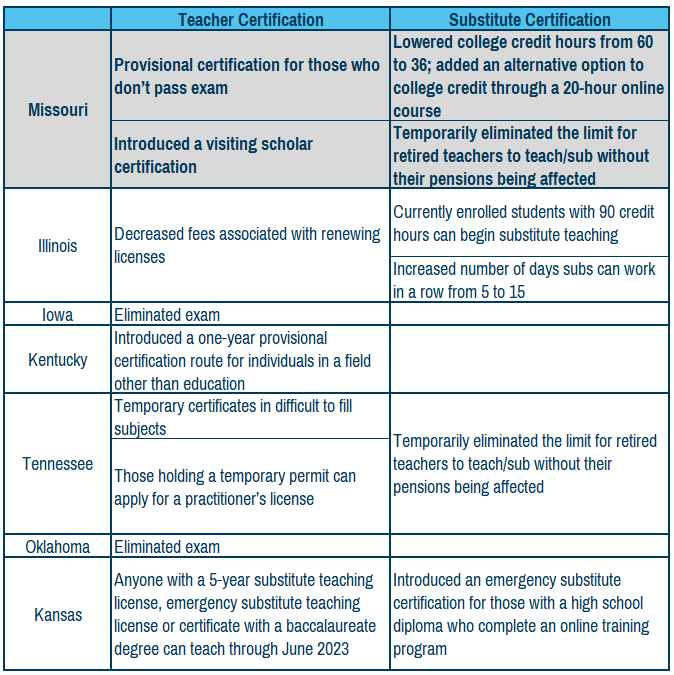Teacher Shortages Cause Missouri to Change Certifications
By: Mel Fenske
Published On: September 07, 2022
The Missouri Department of Elementary and Secondary Education (DESE) estimated there was a shortage of more than 3,000 qualified teachers last fall. This year is not much different, but it is more evident Missouri’s underserved communities are being hit hardest by teacher shortages. Vacancies are also prevalent in “difficult to fill” content areas such as STEM, early childhood, and elementary and special education.
Image by Thirdman
In response, state and local officials have proposed and implemented several strategies to alleviate these pressures. But most are short-term and include expiration dates, like Senate Bill 681 which modifies certification requirements. In this blog, we look at this change to certifications and how our solutions compare to changes in nearby states.
Changes to Teacher Certifications in Missouri
Teachers taking the traditional route to certification through a state-approved teacher preparation program have historically been required to achieve a qualifying score on a designated exit examination. Senate Bill 681 allows those who did not attain a qualifying score, but completed the rest of the requirements, to be granted a two-year nonrenewable provisional certification. The change in exit examination requirements is expected to benefit 550 teachers, 80% of whom are looking to be certified in a difficult to fill subject area. Within these two years, individuals can gain full certification by achieving a passing score on the examination or passing a series of state-approved metrics consisting of multiple evaluations.
SB 681 also alters the certification process for visiting scholars. Those meeting the educational and professional requirements of a visiting scholar can now receive a one-year certificate if they are to be employed as part of a business-education partnership initiative or are filling a vacant position in a difficult to staff public school or subject area. While this is not a route to full certification in Missouri, it can be renewed twice.
SB 681 also created a new 4-year certificate, lowering the number of college credit hours (from 60 to 36) required for substitute teachers. Alternatively, a new option is available allowing substitute teachers to take a 20-hour online course in place of any college credit hours. Lastly, retired teachers who come back and substitute teach have been limited in the past on the number of hours they can work, without their salary and pensions being affected. This act removes this limit until July 2025.
Teacher Certification Changes in Border States
Many of Missouri’s border states are making similar changes to full teaching and substitute teaching certificates (Table 1). Iowa and Oklahoma are eliminating exams entirely, while Illinois and Kansas are focusing on getting substitute teachers in the building. Tennessee's approach is most similar to Missouri, as they are adding temporary certificates and allowing retired teachers to substitute without limits on their pensions.
Teacher and Substitute Teacher Certification Changes in Missouri and Border States
Conclusion
Missouri is making an effort to get more teachers into the classroom this school year by revising both full teaching certifications and substitute teaching requirements. Though short-term in nature, these changes are meant to provide those districts being most severely impacted by the teacher shortage with some breathing room over the next few years. It will be important to identify whether these short-term changes help to fill a significant portion of the existing vacancies.






This week in neighboring Illinois, a bill to ban cell phones from classrooms unanimously passed in the Senate. The bill, advocated for by Illinois’ Governor J.B. Pritzker, now moves to the House. If passed, they would join the more than 40% of states who have laws or policies restricting cell phone use in schools. Missouri has similar legislation in the works, and voters are in support.